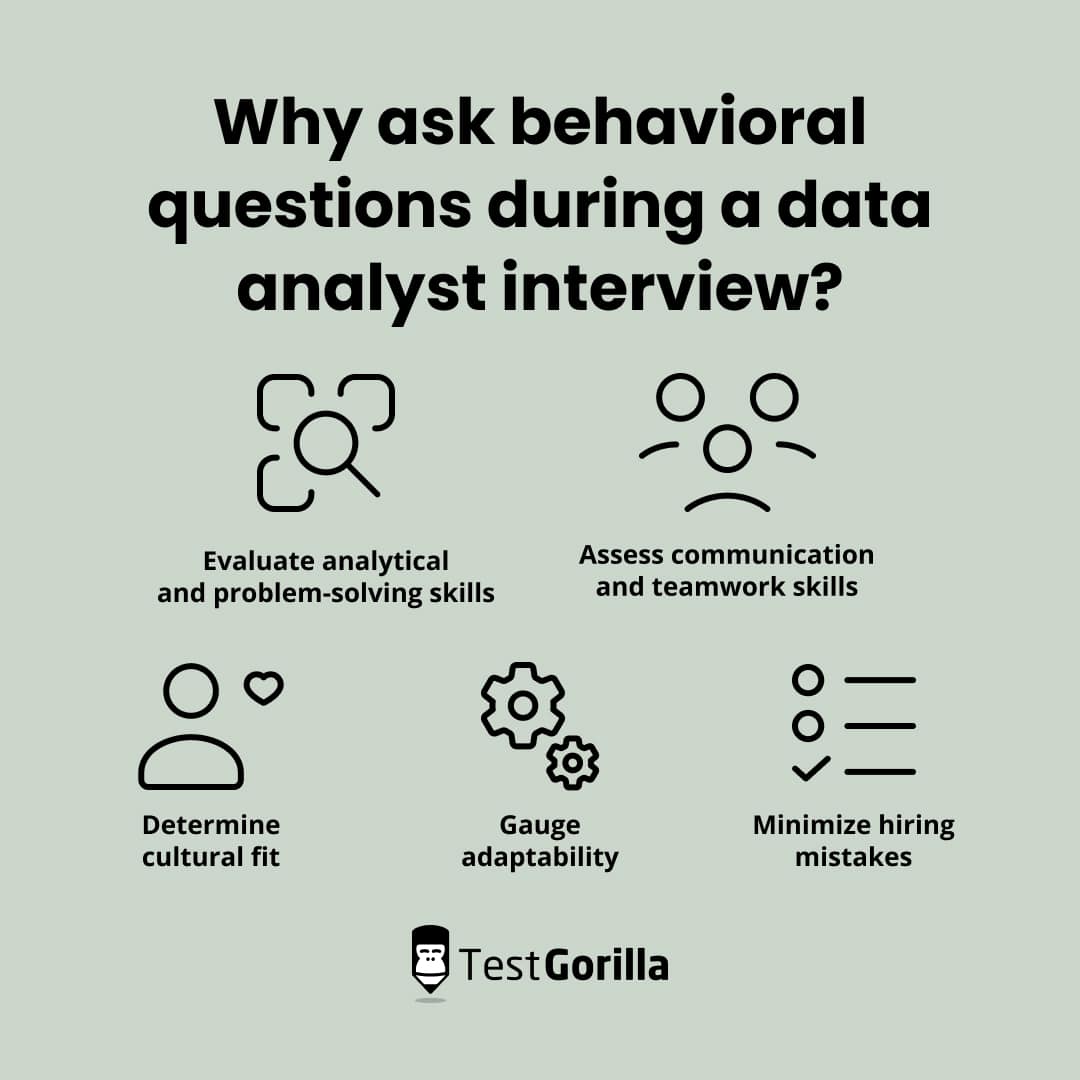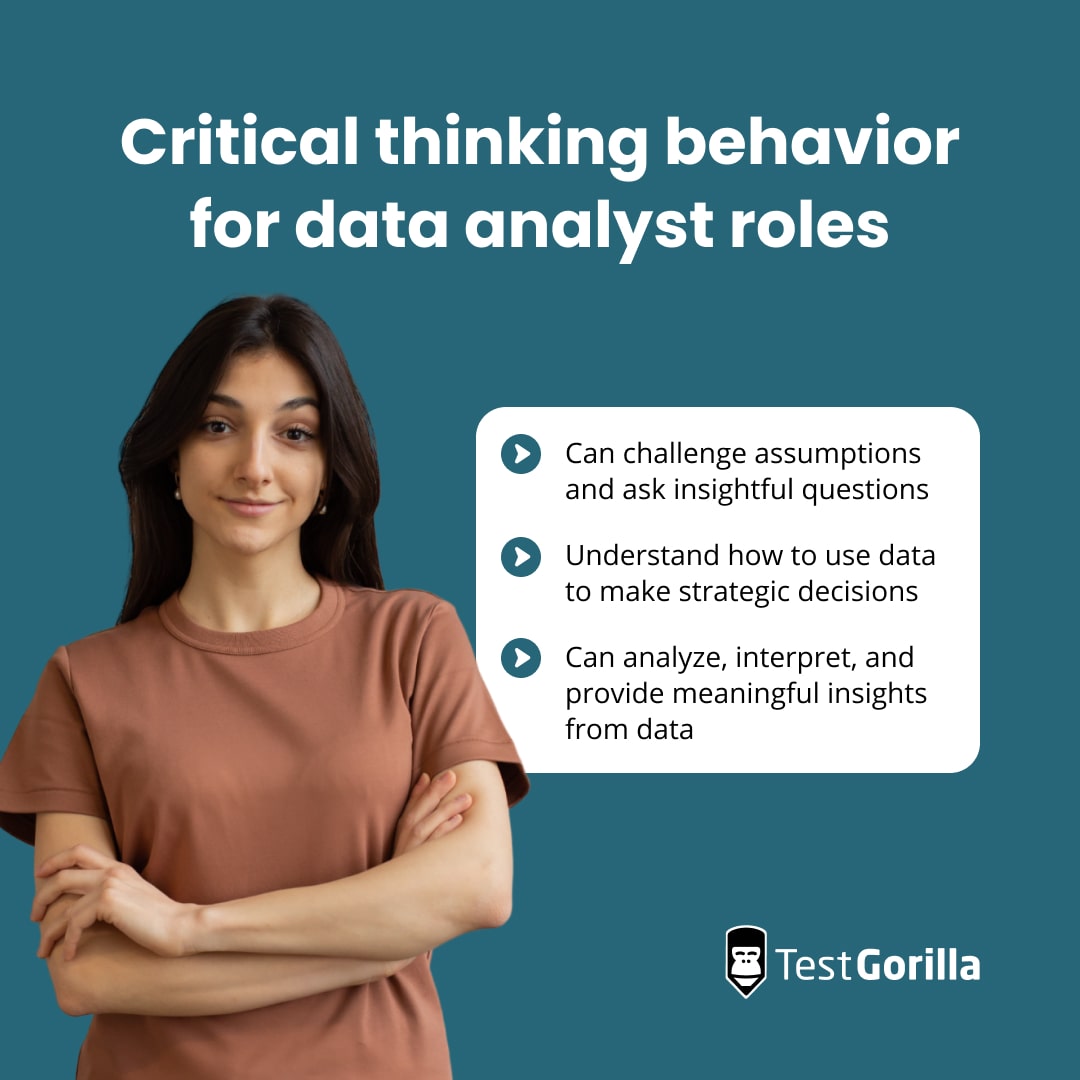Recruiting great data analysts is like finding a needle in a haystack. Not only are you looking for candidates with technical expertise, but you also need people who can blend seamlessly into your team culture and align with your company’s values.
To do this, you need to assess your candidates’ behavioral traits before bringing them aboard. Asking behavioral interview questions is a great way to do this. These questions provide a snapshot of a candidate’s experiences, offering a sneak peek into how they might perform in your company.
We’ve rounded up 24 insightful data analyst behavioral interview questions to help you spot the best talent in your candidate pool. We also explain how you can easily implement behavioral interviews in your hiring process.
Table of contents
What are behavioral interview questions?
Behavioral interview questions dig into a candidate’s past actions to help predict their future performance. They focus on understanding how a candidate has tackled different situations and challenges in their career.
In addition, these questions ask candidates to respond to hypothetical scenarios to gauge how they would react if placed in those situations in the future.
Why ask behavioral questions during a data analyst interview?
Behavioral interview questions provide rich insights that can help you select the ideal candidate for a data analyst position. Using behavioral questions, you can:
Evaluate analytical and problem-solving skills
Data analysts face complex problems and data puzzles daily. Understanding how a candidate has approached such challenges offers a glimpse into their analytical and problem-solving skills.
Assess communication and teamwork skills
Data analysts often have to explain complex data insights to non-technical team members. Probing their past interactions can shed light on their communication skills and ability to work as part of a team.
Determine cultural fit
Behavioral questions can offer insight into a candidate’s values, work style, and motivation, helping you judge if they align with your company’s culture and ethos.
Gauge adaptability
As data trends evolve, data analysts must keep pace with the latest tools and technologies. Asking about their experiences with learning new skills or adapting to changes can help you assess their adaptability.
Minimize hiring mistakes
A thorough understanding of a candidate’s skills and behaviors beyond their resume can reduce the likelihood of mis-hires, saving time and resources in the long run.
24 behavioral interview questions for data analyst roles and answers to look out for
Now that you understand the power of behavioral interview questions, let’s delve into some of the best ones for data analyst roles.
Below, we break 24 questions into eight sets – each focused on a different aspect of a candidate’s skills, experiences, and work style. Use them to bring you closer to finding your next data analyst superstar.
Attention to detail behavior questions for data analyst roles
In data analysis, attention to detail is non-negotiable. An error in data cleaning or a wrong calculation can lead to inaccurate conclusions and costly mistakes. Data analysts with keen attention to detail can spot anomalies, identify errors, and ensure the highest data quality.
Here are three behavioral interview questions to evaluate attention to detail:
Describe a time when your attention to detail prevented a mistake in data analysis.
Can you share an example where you identified a discrepancy in data that others missed? What was the impact?
How do you ensure accuracy when handling large datasets?
Ideal answers will show the candidate’s methods for ensuring data accuracy and their ability to spot inconsistencies. They might describe strategies like double-checking work, creating data validation rules, or using error-detection tools.
Communication skills behavior questions for data analyst roles
Analysts must often explain complex data findings to non-technical team members, clients, or stakeholders. Excellent communication skills can translate raw data into actionable insights that drive business decisions.
Look for candidates who can:
Present their findings in a clear, concise manner
Use data to tell compelling stories
Simplify complex data concepts for non-technical audiences
You can use these three questions to evaluate the communication skills of your data analyst candidates:
Can you describe a time when you had to present complex data to non-technical individuals? How did you simplify the information?
Tell me about a situation when you used data to tell a compelling story that led to a business decision.
How would you explain the concept of data normalization to someone without a data background?
Candidates’ answers should demonstrate their ability to make data accessible and impactful. You’ll want to hear instances where they’ve bridged the gap between technical data analysis and business understanding.
Curiosity behavior questions for data analyst roles
Curious data analysts don’t just answer your questions – they uncover questions you didn’t even know you had. This curiosity pushes them to dive beyond the surface level, looking for connections, correlations, and insights that can propel your business forward.
Here are three data analyst behavioral interview questions to gauge curiosity:
Can you describe a time when you had to delve into a dataset to answer a question that wasn’t part of your initial assignment? What was the result?
Can you give an example of when you made a surprising discovery or insight while analyzing data? What impact did this have?
How do you stay updated with the latest tools and techniques in data analysis?
Good answers might show the candidate’s drive for continuous learning and initiative to explore beyond the assignment’s scope. For instance, a candidate might talk about self-learning new data analysis tools, attending workshops, or taking on projects that stretch their capabilities.
Critical thinking behavior questions for data analyst roles
Data analysts need a strong ability to think critically. This means analyzing data with a skeptical eye, questioning assumptions, and making reasoned judgments.
Pose these questions to gauge a candidate’s critical thinking:
Describe a time when you questioned the validity of data you were asked to analyze.
How would you approach a situation where data doesn’t align with business expectations?
Can you tell me about a project where your initial analysis was incorrect? How did you identify and correct your mistake?
In their answers, you’ll hear about their approach to ensuring data validity, addressing discrepancies, and learning from mistakes.
Watch for candidates who:
Can challenge assumptions and ask insightful questions
Understand how to use data to make strategic decisions
Can analyze, interpret, and provide meaningful insights from data
Time management behavior questions for data analyst roles
Data analysts often work with tight deadlines and must juggle multiple tasks simultaneously. They need to manage their time effectively to deliver accurate and comprehensive data analysis within a given timeframe. Good time management also implies the analyst can prioritize tasks based on urgency and importance.
Here are three questions to assess data analysts’ time management skills:
Tell me about a time when you had to handle multiple data analysis projects simultaneously. How did you manage your time?
Can you describe a situation where you had a tight deadline for a data analysis project? How did you ensure you completed it on time?
How do you prioritize your tasks when you have multiple projects with the same deadline?
In their responses, outstanding candidates might describe their use of project management tools, breaking down tasks into manageable chunks, or setting realistic deadlines and sticking to them. They may also talk about their methods for prioritizing tasks, such as based on urgency, complexity, or business impact.
Problem-solving behavior questions for data analyst roles
Problem-solving is a cornerstone of a data analyst’s role. Analysts need to identify issues in datasets, find solutions to data-related problems, and figure out the best methods to collect, process, and interpret data.
Look for candidates who:
Use a systematic approach to solve data problems
Can identify and fix issues with data collection or processing
Learn from past mistakes to prevent future ones
Ask these questions to understand your candidate’s problem-solving capabilities:
Tell me about a time when you faced a significant issue in data collection or processing. How did you solve it?
Describe a situation when your initial approach to solving a data problem didn’t work. What did you do next?
Can you share an example of a complex data-related problem you solved that positively impacted a project or company?
Answers will reveal the candidate’s problem-solving method, resilience in the face of setbacks, and ability to deliver impactful solutions.
Teamwork behavior questions for data analyst roles
In data analyst roles, teamwork is more than just playing well with others. It includes collaborating effectively, handling conflicts professionally, and communicating clearly. When testing for teamwork in data analysts, you want to look for signs of these abilities.
By asking these three behavioral interview questions, you can evaluate a candidate’s teamwork skills:
Can you tell me about a time when you had to collaborate with someone with a different personality style than yours? How did you handle it?
Have you ever faced a situation where your team disagreed with your data analysis? How did you resolve it?
Can you describe a situation where you put your work or projects on the backburner to help your team meet a deadline?
Candidates should show adaptability, negotiation skills, and the ability to prioritize their team when answering these questions. Look for answers where the candidate explains how they made a conscious effort to build relationships, communicate effectively, or diffuse tension.
Ethical behavior questions for data analyst roles
Ethics in data analysis involves issues such as privacy, bias, and integrity of analysis. A good data analyst must handle data responsibly, maintain its confidentiality, and conduct analysis fairly and impartially.
Here are three questions that can help you gauge a data analyst candidate’s ethical behavior:
Can you tell me about a time when you were asked to do something unethical with data? How did you handle the situation?
Have you ever discovered a mistake in your data after presenting it? What did you do?
How do you ensure your analysis remains unbiased and objective?
Ideal answers to these questions should show the candidate’s commitment to ethical standards. Look for signs of the candidate being able to prioritize ethical considerations, even when it might be inconvenient. Honesty, integrity, and transparency are the traits you want to see.
How to roll out data analyst behavioral interviews
Behavioral interviews offer fantastic information about a candidate's people and soft skills. However, you must pair them with other testing methods to get a complete overview of your candidates.
TestGorilla makes this easy, as you can mix and match various pre-employment screening tests to create a custom assessment for your needs.
Follow these steps when evaluating data analysts’ skills:
Select relevant skill tests for your data analysts, such as TestGorilla’s Data Analysis Using R test or Python Coding test. With these tests, you can assess how technically skilled your candidates are.
Add tests like the Enneagram Personality test and the DISC Personality test to reveal insights into candidates’ personalities and how they may fit into your work culture.
Conduct a one-way video interview with TestGorilla. Candidates will record video answers to pre-determined questions, and you can watch their videos at a time convenient for you. Include some behavioral interview questions for data analysts outlined above, and ask all candidates the same questions. This approach ensures fairness and allows you to review responses at a time that suits you.
Overall, combining behavioral interview questions with other assessments gives you a more rounded picture of a candidate’s suitability for your open role.
Conclusion
Behavioral interview questions shed light on candidates’ typical behaviors and how they might function at your company. These insights, paired with assessments that measure applicants’ technical abilities, enable you to make more informed hiring decisions.
But remember, these behavioral interview questions are only part of the larger recruitment process. TestGorilla's range of skill and personality tests offer additional ways to evaluate job applicants. Results from these assessments help you pick the best person for the job.
To learn more about how TestGorilla can streamline your hiring process, sign up for a free account, watch our product tour, or request a free live demo today
Related posts
Hire the best candidates with TestGorilla
Create pre-employment assessments in minutes to screen candidates, save time, and hire the best talent.
Latest posts
The best advice in pre-employment testing, in your inbox.
No spam. Unsubscribe at any time.

Hire the best. No bias. No stress.
Our screening tests identify the best candidates and make your hiring decisions faster, easier, and bias-free.
Free resources
This checklist covers key features you should look for when choosing a skills testing platform
This resource will help you develop an onboarding checklist for new hires.
How to assess your candidates' attention to detail.
Learn how to get human resources certified through HRCI or SHRM.
Learn how you can improve the level of talent at your company.
Learn how CapitalT reduced hiring bias with online skills assessments.
Learn how to make the resume process more efficient and more effective.
Improve your hiring strategy with these 7 critical recruitment metrics.
Learn how Sukhi decreased time spent reviewing resumes by 83%!
Hire more efficiently with these hacks that 99% of recruiters aren't using.
Make a business case for diversity and inclusion initiatives with this data.





















